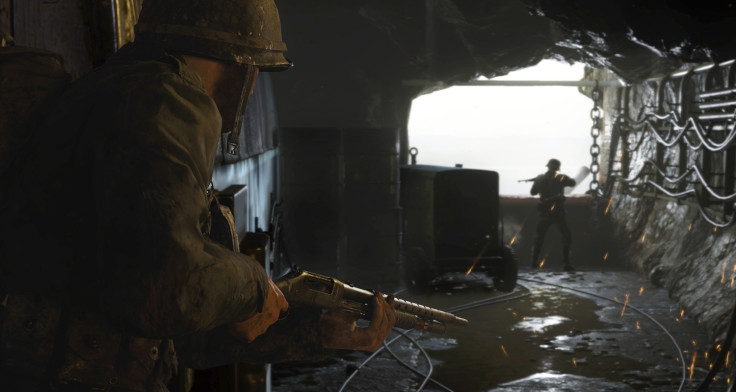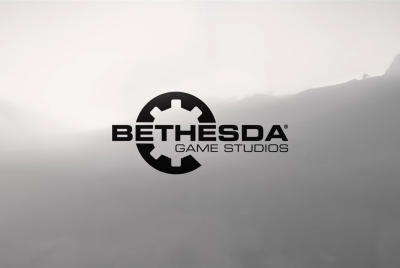Call of Duty WW2 review: COD returns to its roots with a pleasantly surprising campaign
Activision's juggernaut series returns on PS4 and Xbox One.
On 6 June 1944, thousands lost their lives on the beaches of Normandy as Allied forces made their vital first move into Nazi-occupied Europe. Along the blood-washed coast a vast war effort set up camp ahead of a push into France, through Belgium and toward Germany.
Vast ships carrying supplies and fresh troops sit in the shallows, trucks move along roads forged between Czech hedgehogs and high-ranking officers issue commands from bombed out bunkers that once housed German gun nests.
Sledgehammer Games recreates this scene as the hub area of Call of Duty: WW2's multiplayer. Players can obtain weapons here, train and, most jarringly, summon loot boxes that plummet to Earth and spill their wares for you and fellow players to see.
These 'supply drops' crash to Earth with all the subtlety of a Panzer division, reminding you that as well as Sledgehammer often does navigating the complexities of making entertainment out of this dire time in human history, it is still making the big budget video game blockbuster publisher Activision demands.
Call of Duty's return to the Second World War is also a return to the series' gameplay roots. The near-future, wall-running gimmicks of recent entries have been stripped back, and this back-to-basics approach couldn't have been timelier given the cold response to last year's sci-fi escapade Infinite Warfare.
The history of World War 2 shooters is dominated by EA's Medal of Honor and early Call of Duty titles. Each series memorably depicted D-Day, an event that encapsulated the sheer terror of war, and Call of Duty: WW2 is no different.
A sequence introducing the core cast of the 1st Infantry Division opens the campaign, as player-character Private Daniels provides a voice over with his rural, All-American twang. It's clichéd stuff setting up their introduction to the theatre of war.
Soon after they're on a boat nearing the French coast, being tossed around by the waves before German artillery opens fire. The closer they get, the more terrifying the ordeal becomes, before they finally make ground. It's a brutal, gory sequence that does well to capture the horror of the situation.
Making something as horrendous as D-Day "fun" is understandably considered by many to be in poor taste, but just because this is a game doesn't mean fun is the ultimate goal. More than pure enjoyment, Call of Duty: WW2 aims to capture the urgency of these situations, the sense of survival against great odds, and accomplishes this pretty well - if not perfectly.
When the player takes control of Daniels for the first time, they're put into a position where they have very little power. They can't stop or halt the thunderous gunfire tearing down their fellow soldiers, all they can do is run, dive behind cover and slowly make their way up to the German defences.

The campaign is at its best when the player feels vulnerable, and like a small part of the larger war machine. It's still a single player game, so the player being the sole human-controlled combatant does mean they will dispatch of more enemies and complete more objectives, but there are also moments when the game itself goes out of the way to aggrandise the player.
Players take out entire airborne squadrons and their actions are implied to have saved the whole city of Paris. These are also the moments of greatest spectacle: a mandated spectacle Sledgehammer and Activision feel is required. A compromise evident of the homogenised nature of the enormous, money-spinning series.
It isn't. The best moments of the campaign are when the First are moving across a field behind the cover of friendly tanks, when the Allies are moving on a farmhouse, or in its chaotic depiction of the Battle of the Bulge, when all seems to be lost.
The ending is also particularly well-handled, turning around a fairly trite plot with a well-handled twist, some good character work and a conclusion that drives home the horror of what the Nazis did without so much as a single bullet having to be fired.
That's the campaign, then there's the rest of WW2, which offers even clearer examples of the processed feel of this series.
Sledgehammer's stripped-back mechanics make multiplayer a grounded affair more in line with early Call of Duty games I remember playing for whole evenings at a time, but that comes at the expense of feeling a little dated as well. It also feels dated compared to the thrills offered by competing multiplayer shooters like Destiny 2 and Overwatch.
Call of Duty's status as a prominent esport also has this odd, streamlined feel. It takes little more than a second to bring down a player, when that player is you your body crumples comically fast like footage played at double speed. It's as though the aim is to make Call of Duty as fast a game as possible by shaving off every millisecond to reduce the experience to something that works better for skilled players and esport spectators than it does for regular joes.
With only a paltry nine maps for the basic modes, I haven't found many reasons to return to the game, but diehard Call of Duty fans undoubtedly will. War mode is an exception. This multi-stage mode is an answer to similar modes in Battlefield, but with a smaller scale that works for the series.
Matches can be gruelling, and Sledgehammer has balanced the mode well enough that contests are often tightly-fought, making for some thrilling, desperate push-and-pull contests in the final stretch.
Zombies, the round-based horde mode that's been a regular feature of the series since 2008's World at War, is also back, checking off the co-op box with flair. The big names involved this year are David Tennant, Elodie Yung and Ving Rhames, with Tennant in particular enjoying chewing up scenery.
Call of Duty: WW2 is for the most part exactly what you expect it to be. Sledgehammer Games has made a solid entry in an annualised series that rarely disappoints, which treats its subject matter surprisingly well. Its few surprises are to be found mostly in the campaign between the moments of cheap spectacle, when it successfully recaptures exactly why World War 2 shooters were so popular and prevalent over a decade ago. The multiplayer is the simplest definition of an online shooter, with few thrills, but it's essentially exactly what fans have been asking for.



















